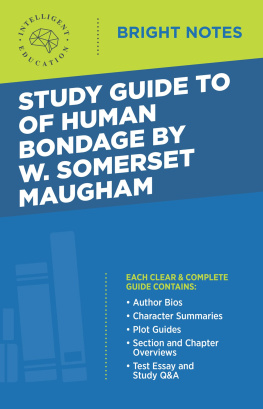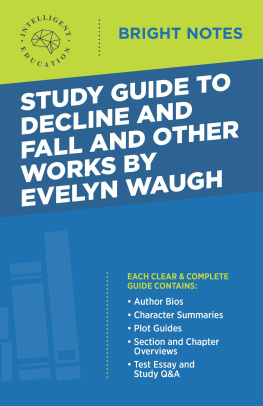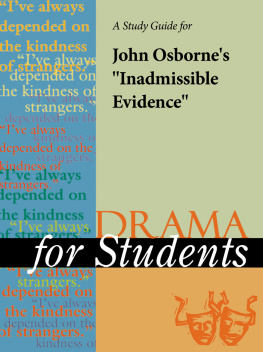

BRIGHT NOTES: A Separate Peace
www.BrightNotes.com
No part of this publication may be used or reproduced in any manner whatsoever without written permission, except in the case of brief quotations in critical articles and reviews. For permissions, contact Influence Publishers http://www.influencepublishers.com.
ISBN: 978-1-645422-72-3 (Paperback)
ISBN: 978-1-645422-73-0 (eBook)
Published in accordance with the U.S. Copyright Office Orphan Works and Mass Digitization report of the register of copyrights, June 2015.
Originally published by Monarch Press.
Christopher Russell Reaske, 1966
2020 Edition published by Influence Publishers.
Interior design by Lapiz Digital Services. Cover Design by Thinkpen Designs.
Printed in the United States of America.
Library of Congress Cataloging-in-Publication Data forthcoming.
Names: Intelligent Education
Title: BRIGHT NOTES: A Separate Peace
Subject: STU004000 STUDY AIDS / Book Notes
CONTENTS

JOHN KNOWLES
INTRODUCTION
A WAR NOVEL
John Knowles A Separate Peace is an intensive inquiry into the nature of war. It is the story of how a group of sixteen-year-old boys, all students at Devon, an American preparatory school, attempts to establish a peace far away from the war in the large outside world. Each boy, in a different way, views the war as a disaster which will sweep them all away unless it can be resisted. Each student, as he nears eligibility for the draft, confronts the facts about war in a different way. While Knowles never takes us into real war, in the sense of combat, he leads us into the war through the ways in which war is viewed by maturing adolescents on the brink of being called to do their part. Thus A Separate Peace is, first and foremost, a war novel. But because the action takes place far away from the war, it is a very unusual war novel.
MAINSPRING OF WAR
Knowles conclusion about the cause of war is presented through the thinking of the narrator, Gene Forrester. In attempting to enjoy a separate peace at Devon the boys, in fact, engage in warlike activities. They are unable to escape from the concept of war merely because they are removed from the battlefield. As human beings they are all potential warriors. Men everywhere share one supreme defect, a tendency to make war. The nature of the enemy changes but the nature of the warring instinct does not. As Gene states four pages from the end of the novel, it seemed clear that wars were not made by generations and their special stupidities, but that wars were made instead by something ignorant in the human heart. Because of this basic human ignorance, war will always exist in one form or another, if not on actual battlefields, on school playgrounds, and in the minds and hearts of individuals everywhere. This tendency is not so much to be pitied as simply to be recognized. Although some of the boys at Devon can, with varying success, ignore the reality of war temporarily, sooner or later this reality will come crushingly in upon them. War will intrude into private separate peaces everywhere.
POINT OF VIEW
The novel is narrated by Gene Forrester. Knowles is, in effect, the narrator; he does not even tell us Genes last name until the sixth chapter, and then only incidentally. The name of the narrator is unimportant, inasmuch as we are listening to the author, Knowles himself. The book is narrated from the point of view of a student returning to Devon fifteen years after graduation. The narrator allows himself to be transported into the past, into a very special kind of preparatory existence for life on the outside. The narrator therefore has fifteen years hindsight. He is able to understand more in retrospect than he originally could in anticipation. The wisdom of Gene Forrester is the wisdom of John Knowles as a matured young man. The narrator Gene Forrester realizes that he fought the real war while still at Devon. Since graduating Gene has been in the army; he went to boot camp but the war ended sooner than anyone expected. As the narrator states, I never killed anybody, and I never developed an intense level of hatred for the enemy. Because my war ended before I ever put on a uniform; I was on active duty all my time at school; I killed my enemy there. Gene understands this now, fifteen years later; it is important to remember that he is writing about something long in the past, even though the story is so vivid that it seems to be the present. Gene realizes now - but did not originally - that each of his friends was almost unconsciously trying to erect a defense against a suspected threat, the war.
THE UNIQUENESS OF FINNY
Finny is the only boy at Devon who does not actually fear the war. As a competitive sportsman, Finny feels no need to erect a barrier between himself and the war. In fact, after his accident, he fears that he will not be able to be in the war. When he does not hear from the various American armed services -Marines, Navy, etc. - he even writes to Russia and China, to see whether he can perhaps be in the war by fighting in their armies. He creates fantastic illusions to replace the reality of the war because he fears he will not be able to enlist. He alone, however, does not erect what Knowles visualizes as a private Maginot Line.
From the beginning of the novel, Knowles has made it very clear that Finny is unique, is a special kind of human being. He exerts a hypnotic and charismatic charm over Gene and the other boys. He realizes that some of his actions - like establishing the Devon Winter Olympics - were escapes from the reality of the war, a war whose actuality is brought home through the tragic destruction of Edwin Lepellier, or Leper as he was called. Lepers tragedy becomes Finnys confrontation with his own idea that the war did not really exist, that it was the fabrication of a bunch of fat, middle-aged men whose self-interests perpetuated the gigantic rumor of war.
THE SETTING
When the novel begins, it is the summer of 1942. America is at war and summer session is open at the Devon School in New Hampshire. Newsreels and magazines are presenting pictures of war to the whole country. Bombs are being dropped by America on Central Europe. The summer is a moment in history, and Knowles offers us some of the characteristics of that moment:
The war was and is reality for me. I still instinctively live and think in its atmosphere. These are some of its characteristics: Franklin Delano Roosevelt is the President of the United States, and he always has been. The other two eternal world leaders are Winston Churchill and Josef Stalin. America is not, never has been, and never will be what the songs and poems call it, a land of plenty. Nylon, meat, gasoline, and steel are rare. There are too many jobs and not enough workers. Money is very easy to earn, but rather hard to spend, because there isnt very much to buy. Trains are always late and always crowded with servicemen. The war will always be fought very far from America and it will never end.
This then is the picture of America as a nation involved in a war being fought on foreign soil. Knowles is able to recollect the atmosphere of America in that distant summer of 1942.
SIXTEEN-YEAR-OLDS
It is important to bear in mind that the boys in the story are sixteen years old. They are not quite old enough to fight for their country. They are regarded by the adult world as the last people in the youthful world. Adults want the sixteen-year-olds to enjoy themselves now while they can, because soon they will be fighting to protect these same adults. The adult world is anxious for the boys to have a last happy period in their life before they go to war. The narrator states his belief that sixteen years old is the natural age for a human being to be.
Next page












